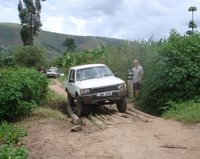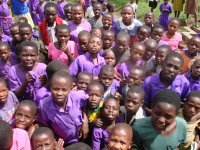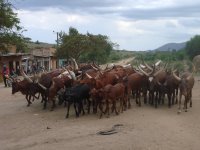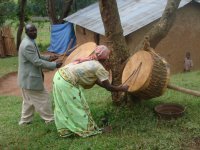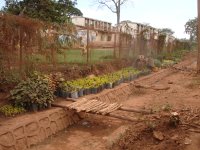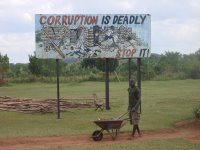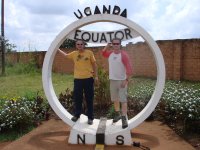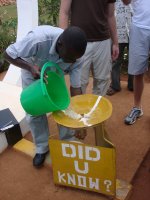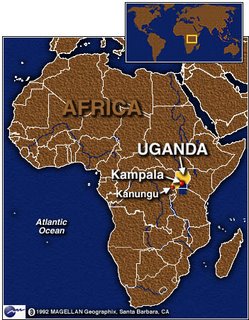Kigali, Rwanda
This weekend was spent in Kigali, Rwanda. We travelled Friday by mini-bus and arrived in the early evening. We found out apon arrival that Saturday was a holiday and nothing was open, so we spent the afternoon sitting by the pool at the Hotel des Mille Collines. We didn't stay there, we were at a much cheaper hotel, but for a small fee the pool can be used. Half the group spent the last night at the Mille Collines but I decided that drinking beers by the pool and having dinner in the fancy restaurant was a sufficient experiece at the famous hotel, especially with a $us140 a night price tag. Besides, our hotel had much more 'character'. Every room had something interesting. For example, my room had no shower door so the floor flooded while showering, and part way through the weekend, the mirror fell off the wall. Other examples in other rooms include minor flooding and non-functioning toilets.
Sunday was spent visiting the genocide memorial and a church outside Kigali that has been left escentially unaltered since the genocide. Both were incredibly interesting and provide a very real look at the genocide. We again ended up at the Mille Collines, this time for some drinks and dinner.
Yesterday was spent experiencing real travel in Africa. We bought tickets for a bus from Kigali to Mbarara but the bus was enroute from Burundi. With the western perspective in mind, we assumed buying tickets meant buying seats. We were wrong. We sat on the floor in a very crowded aisle. I had my backpack so I at least had something to sit on but I still had the guy behind me basically stratling me with his knees and the guy in front was sitting on an arm rest and occasionally ended up on my knee. The buses here are the kings of the road and drive very aggressively. Rwanda and Southern Uganda are very hilly so you can imagine what its like drivingvery fast while sitting in there conditions. Every corner you are clutching onto something to avoid falling over. After 5 hours (1 hour to cross the border) you feel totally drained of energy. It was quite an experience and I definetely learned the importance in securing a seat for future travel, especially the 20 hour ride to Tanzania at Christmas.
Today I head to my job site and work begins tomorrow!
 A view of Kigali from our hotel room
A view of Kigali from our hotel room
 Kigali Memorial Center. Opened in 2004, it is the location of both the museum and the mass graves
Kigali Memorial Center. Opened in 2004, it is the location of both the museum and the mass graves
 Stained glass window at the Memorial Center
Stained glass window at the Memorial Center
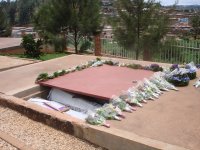 At the Kigali Memorial center there are more than 250,000 people buried in numerous mass graves. This number continues to increase as more grave sites are found and relocated here
At the Kigali Memorial center there are more than 250,000 people buried in numerous mass graves. This number continues to increase as more grave sites are found and relocated here
 The Rwanda flag and one of the nicer areas of Kigali
The Rwanda flag and one of the nicer areas of Kigali
 Inside this church memorial there are a large quantity of human bones and skulls. It is a very creepy place but it is a reminder of the worst humanity can achieve
Inside this church memorial there are a large quantity of human bones and skulls. It is a very creepy place but it is a reminder of the worst humanity can achieve
 The Pope visited Rwanda in 1990, just when tensions leading to the genocide were once again starting to escalate. The remains of a poster hang in the church memorial
The Pope visited Rwanda in 1990, just when tensions leading to the genocide were once again starting to escalate. The remains of a poster hang in the church memorial

The street venders in the city have merchandise catered for the particular area. I knew I was in a good part of town when this guy was selling the Economist, Time, and BBC Africa Report on the street corner.
 The famous pool at the Hotel des Mille Collines
The famous pool at the Hotel des Mille Collines
 The Kigali bus park. Another excellent example of orderly chaos functioning in Africa.
The Kigali bus park. Another excellent example of orderly chaos functioning in Africa.
Sunday was spent visiting the genocide memorial and a church outside Kigali that has been left escentially unaltered since the genocide. Both were incredibly interesting and provide a very real look at the genocide. We again ended up at the Mille Collines, this time for some drinks and dinner.
Yesterday was spent experiencing real travel in Africa. We bought tickets for a bus from Kigali to Mbarara but the bus was enroute from Burundi. With the western perspective in mind, we assumed buying tickets meant buying seats. We were wrong. We sat on the floor in a very crowded aisle. I had my backpack so I at least had something to sit on but I still had the guy behind me basically stratling me with his knees and the guy in front was sitting on an arm rest and occasionally ended up on my knee. The buses here are the kings of the road and drive very aggressively. Rwanda and Southern Uganda are very hilly so you can imagine what its like drivingvery fast while sitting in there conditions. Every corner you are clutching onto something to avoid falling over. After 5 hours (1 hour to cross the border) you feel totally drained of energy. It was quite an experience and I definetely learned the importance in securing a seat for future travel, especially the 20 hour ride to Tanzania at Christmas.
Today I head to my job site and work begins tomorrow!
 A view of Kigali from our hotel room
A view of Kigali from our hotel room Kigali Memorial Center. Opened in 2004, it is the location of both the museum and the mass graves
Kigali Memorial Center. Opened in 2004, it is the location of both the museum and the mass graves Stained glass window at the Memorial Center
Stained glass window at the Memorial Center At the Kigali Memorial center there are more than 250,000 people buried in numerous mass graves. This number continues to increase as more grave sites are found and relocated here
At the Kigali Memorial center there are more than 250,000 people buried in numerous mass graves. This number continues to increase as more grave sites are found and relocated here The Rwanda flag and one of the nicer areas of Kigali
The Rwanda flag and one of the nicer areas of Kigali Inside this church memorial there are a large quantity of human bones and skulls. It is a very creepy place but it is a reminder of the worst humanity can achieve
Inside this church memorial there are a large quantity of human bones and skulls. It is a very creepy place but it is a reminder of the worst humanity can achieve The Pope visited Rwanda in 1990, just when tensions leading to the genocide were once again starting to escalate. The remains of a poster hang in the church memorial
The Pope visited Rwanda in 1990, just when tensions leading to the genocide were once again starting to escalate. The remains of a poster hang in the church memorial
The street venders in the city have merchandise catered for the particular area. I knew I was in a good part of town when this guy was selling the Economist, Time, and BBC Africa Report on the street corner.
 The famous pool at the Hotel des Mille Collines
The famous pool at the Hotel des Mille Collines The Kigali bus park. Another excellent example of orderly chaos functioning in Africa.
The Kigali bus park. Another excellent example of orderly chaos functioning in Africa.




